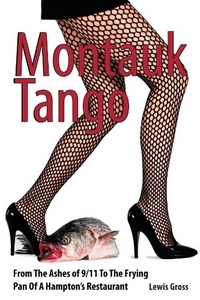 MISS MORGAN'S BOOK BRIGADE |
 Discover May's Best New Reads: Stories to Ignite Your Spring Days. |

Purchase
iUniverse Non-Fiction Memoir Excerpt of Montauk Tango by Dr. Lewis GrossChapter 1Memorial Day In a spontaneous act of guerilla tango, I tore my wife from her baking cupcakes and forced her into a tightly held dance embrace. Fortunately, no one was watching. Pulling her outside through the back door of our seaside restaurant and into the unoccupied beach parking lot, we aped arms in parallel position. “Beast!” she cried. I ripped her apron off and led her through an impromptu tango. Our entire bodies engaged in the complex rhythm—slow, slow, quick, quick, slow. The tango lesson continued. “One, two, left leg back on three, four, cross on five, right leg back on six, seven, close on eight. Good, now repeat.” The poor woman shook like a fallen leaf. “Opening day jitters?” I asked, face-to-face. “Remember. Eight steps and cross at five.” Turning shoulders, I dragged my shoeless left foot slowly through the sand. “If you have to speak it, you can’t lead it.” She hesitantly stepped back on her right and made a half-hearted embellished kick. “The cupcakes?” she screamed. “Screw the cupcakes.” We walked tentatively in an open embrace following an imaginary circle, a solitary couple dancing on an empty stretch of beach. Soon, we picked up the pace and closed the space, intimately attached breast to chest. A few practice exchanges and then we connected cheek-to-cheek, till our foreheads touched at the third eye. She looked down at her watch. “Scissors. The boys are late?” She stopped dancing and attempted an escape back to her baking. “I called already.” Their incoming truck roared louder than the crashing waves. “Now look what you’ve done, gone and woke the child.” “Sure I called, to see if they lived. Everyone is waiting,” I said. “You’re just a fair weather father. Can’t you have some blind faith for once?” Giving up on the tango, we proceeded back to the Shack for last-minute preparations. Opening night was only three hours away and our three coming-of-age sons were already late. Tracey put the apron back on. Fortunately, a black flatbed loaded with wooden fish crates and nets of clams tore into the rear lot and screeched to a halt. “Oh, look, they’ve come to play with us,” Tracey said. “Morning?” I rolled my wrist inward to show time. “Gifts from the sea!” Our oldest son, the fisherman, offered up a freshly caught porgy and kissed it on the lips. As he affectionately squeezed the body, a dark fluid dripped down his arm. “Ah, herring for breakfast?” “Do we really need to know what’s in the anus?” asked the musician, our middle son, as he helped his brother unload the dock produce from the truck. The youngest, the family chef, came out to assist. “I can’t cook a Montaco without the fish. Where were you guys?” “I had to check out a blitz. Fortunately, it was a false alarm,” Arden said. “Otherwise, we might still be there.” Sky dropped the load of clams. Head chef Scott, his mane of hair held beneath a flour sack cap, confidently strolled past us, canvassing his piece of turf, issuing opening-day directives. We paid him megabucks to whisk the crew of seasonal help into a well-bound kitchen. Gathering the whole staff together in the back prep room for a last-minute pep talk, Scott preached his restaurant rules. “We make the big bucks by buying the best ingredients, preparing it just the way I taught you to, and persuading the customers to try it.” My beautiful wife beamed like a proud parent at her son’s graduation. He looked each one of us in the eye. “I’m confident. You kids are the heart of our community. Just do what I taught you, and the customers will love us. To the Shack!” Scott raised his arm in triumph. “Gig Shack, Gig Shack!” the troops cheered. “Young-ins, to your stations!” Scott railed. One for all, and all for one, they high-fisted. Some positioned themselves outside for the first celebrity sighting. I followed our leader with rapt attention as he inspected the final dinner preparations. “Tell me, Scott, what is it going to be like opening a restaurant in the Hamptons? Will we make any money? Will it make me happy?” His face cringed as if a failed root canal was calling. I assumed we would be an immediate hit in this seaside summer retreat. Our new restaurant would be a neighborly affair where local youth could grab a Montaco, the striped bass caught that morning from the shore, or hang for an impromptu jazz gig. We’d create a beachside Bohemian Bistro where surfers and surfcasters could share an espresso with resident artistic dignitaries, such as Paul Simon and Jimmy Buffet, while admiring my son’s handmade guitars. Meanwhile, Edward Albee would be entertaining a gaggle of want to-be playwrights, and Ralph Lauren would be rolling up in an antique Rolls Royce. Like the announcer’s voice from “Live! It’s Saturday Night!” we would play “Live! At the Gig Shack!” Pots and pans clanged like harbored metal boats, waiters ran to and fro practicing the taking of notes, charred meat emitted barbequed motes, and expectations of a full belly churned my stomach’s hopes. Suddenly, the noise from the dozen cooks and counter staff muted. Scott stopped in silence. Silence. I continued talking. “Everyone always said Tracey and I would be perfect restaurateurs. I’m a natural host and she loves to cook. Do you think Montauk’s ready for a change?” Questions I should have asked before opening the door. “My biggest concern is the effect it will have on my marriage.” Slowly, ever so slowly, he stuck a pointed finger into my chest and surgically traced the outlines of my heart, his hand stopping in the center as it played with an open button. With expert deliberation, his hands worked, but his tongue cut like a scalpel. “Doc, you stick to your teeth,” referring to my dental practice in New York City, “and leave the restaurant business to me.” With that, Scott focused his attention on the inspection and barked more last-minute instructions. Round one went to him and we hadn’t even opened yet. Next on the list was the outside beer and wine bar. We walked through the back kitchen prep area, past the gelato counter and through the indoor dining area, out a side door and into the alley. Under an awning, the bartender assembled the outside wine and beer bar, haphazardly placing the beer bottles. “Man, this is great. We’re going to rock Montauk,” said the young man. “What did I say to you? Line the bottles up neatly,” ordered Scott, rearranging the beers in size order. “I thought by nationality,” the bartender apologized. “Sorry, I’m a bar back.” Arranging the bottles with stern concentration, Scott said, “Then get out from behind the bar. If you’re going to be our full-time bartender, you have to know beer from the customer’s point of view, as well as the origin and flavor of every bottle you serve.” “Yeah, man, I’m down on the beers already.” He took a deep, satisfying swig of Oregon’s Dead Guy Ale and smiled. “That’s number thirty-nine on my list.” “Keep up the good work.” Scott adjusted the sleeve on his patchwork velvet coat, and we headed back inside to review the twelve flavors of gelato. “I’m ready, boss.” The just-graduated-high-school counter girl said. “Remember, as soon as a customer places an order, their mouths start to salivate,” instructed Scott. “They picture the food before it hits the plate.” “No worries, boss, your Lamburgini’s a homerun.” “Ground Moroccan lamb and secret spices on a whole wheat roll,” the girl said, and then sensually licked the length of her lips. Confident she could explain the menu to an incredulous customer, she blushed suddenly with embarrassment. “The spices are Moroccan, not the lamb? I think. Sorry, this is my first real job.” Our food would be substantial, honest fare. Eco-farmed vegetables simmered into a ratatouille and seasoned with my garden’s homegrown herbs. Lobster bisque braised in their shells and the bones of hand-caught black fish. A perfectly prepared burger with freshly spaded fries. In our food hall, there would be no simple starch, like they serve Up Island; there would be no deep-fried, fat-laden, nutritionally devoid spring rolls and high-calorie wontons—mere spoons to mop up alcohol and their patrons’ pennies. Continuing his check-off list, Scott made a virtual tour of the entire restaurant, from rear prep area to the L-shaped front counter to the interior seating for fifty, side alley bar and additional sidewalk bistro seating for thirty. “That should do it.” In the corner, the food runner was frenching her boyfriend. They were inseparable, like twins joined at the lips. “What’s up, boss?” she chimed in an attempt to untangle her boyfriend’s tongue from a mouthful of her metal braces. “No worries.” Scott’s face twanged as if he had ground down on that same infected tooth that stood above its socket. He looked away in disgust. Our three sons, aged eighteen through twenty-three, swatted stray flies and shagged odd jobs, this being a family-run, initially low-budget team. The only employee besides Scott with any experience was a seventy-year-old grandma, whom we had stolen from the Fish Farm for a free agent’s salary. She had worked the food business for centuries and was slated to run the food prep. “The cool slaws a’ ready,” she spoke in a Bonacker drawl, the unmistakable patois of the Lazy Point locals. She waved a six-inch steel blade like a warm-up bat and added, “You wan’ a mango salsa?” That woman had cracked more clamshells than the seagulls’ dive-bombing off Gosman’s Dock. “No dancing,” replied Scott, rolling his eyes and walking away briskly. He turned back to me and whispered, “I need to teach that woman how to use a food processor. Cutting every cabbage by hand, she’ll be here all night.” I was the silent partner, as long as I stayed silent. Otherwise, I was benched. Tracey had her team raring to go. The fish tacos were jumping, and the Gig Chips, homemade and spiced, were flying out of the fryer as we anxiously awaited the invasion of tourists. Located in Montauk, a seasonally busy pedestrian spot and surrounded by other, long existing restaurants, we were bound to be an immediate hit. Standing in the street, we admired our handiwork. “It was a steal!” I told Scott the story of how we bought the building that housed the present-day restaurant. “The broker called it a real steal.” “Brokers need to shake the leaves,” he said arrogantly, winning round two. “We were always feeding the local kids anyway,” I said, offering yet another reason our restaurant was destined to be a hit. “Our house was their food hall.” Deciding not to comment on that, Scott instead said, “I love Tracey’s design, the corrugated steel walls.” His eyes searched longingly for our perpetually busy hostess. “Using the local phone exchange, 668, great name.” “The legal name is 668 the Gig Shack, but we refer to it as the Shack, for short.” “Yeah, whatever.” I stuck my hands in my pockets. “Will we ever make a buck?” “Money, money, money.” Scott fingered his unkempt mop. I ignored his insult and continued with the story. “It was originally a rundown ice cream parlor, but Shaggy, the previous owner, ran it like a regular restaurant. He even had a full liquor bar outside in the alley. He showed me the license one time.” “My menu is going to shake that old timer off his pedestal. You just wait and see—I’m going to put Montauk on the food map,” boasted Scott. “Shaggy is an institution in this town. He was the Grand Marshal once in the St. Patrick’s Day Parade. That’s bigger than being the mayor of Montauk.” I didn’t know why I was defending my competitor, who operated another nearby restaurant, but it seemed like the right thing to do at the time. “Just wait till the Hamptons gets a taste of my Lamburgini and Montacos.” With his floral pants, polka-dotted bandana, and tie-dyed sneakers, Scott looked like the Jolly Green Giant perched beside the little table runner. At four foot eleven, she was Lolita-like, with perky breasts and tight-fitted shorts inked with “The End” on her ass. The two made an incongruous couple out on the sidewalk, handing out flyers to passersby. “I hope you’re right,” said the runner, surveying the empty dining room. Scott promised, “By the end of summer, we’ll be making money hand over fist.” “How come nobody’s coming in?” I asked. “Aren’t you supposed to be the silent partner?” he said, trying to hand me a stack of flyers. “Here, you want something to do?” I pushed the flyers back. “Not my job.” We circled one another like two male cats spotting new territory. Which of us would get to leave his scent? He knew the business, but I had the bucks. After a three-second eyeball, he retreated into the back prep kitchen. What had I won? Eventually, an older couple entered from the front sidewalk patio and peeked their faces through the open door. They appeared confused as they searched the corrugated steel walls for a familiar clue. “Wasn’t this an ice cream parlor?” they asked. “It looks so clean and new.” Their eyes searched the hand-painted and artistically calligraphic blackboard menu. “New ownership?” They looked at each other incredulously, as if the menu were written in Chinese. “Try the Lamburgini.” Before I could explain what a Lamburgini was, they had run out and into Shaggy’s restaurant across the street. The evening continued in much the same way. Customers would look confused and then run to Shaggy for dinner. By the end of the night, not only weren’t we an immediate hit, we were completely shut out. Blame it on the bad weather, the bad economy, or just bad planning, but our opening weekend was a disaster. The locals came. More often they went. They’d peek in but preferred to wait an hour and a half for a table elsewhere. Over our heads, it rained and rained, another perfect spring day. That first Sunday night, Tracey and I waited for the Hampton Jitney to arrive. The rising tension was etched into my beautiful wife’s brow. Fear had filled the creases the Botox had missed, her face frozen in a deeply pained frown. “What was I thinking?” Tracey moaned. “I’ve sunk all our available cash into this folly. We don’t know squat about this business. At this pace, we’ll never break even.” “Don’t fret. The season has just begun.” I placed a hand on her shoulder. “No one came, not even our friends,” she fretted. “It may take a little time for the community to understand your product. I’m confident you and the boys will be a big hit.” “Maybe we should have had a hard opening, hired a few celebrities and invited the local papers for a free bash. What do you think?” “Now you’re asking me? You didn’t want any press releases. You’re still not confident in the staff.” “But look how packed that new Surf Lodge was this weekend. They just opened, and they’re already being written up in the Star. What did I do wrong?” “They’re just a bunch of drop-in, soft-top surfers! You’re the real deal.” “The wave should have been wide enough for us all,” she moaned. “Surfing is a territorial sport. The wave belongs to the cat most willing.” The owners of the Surf Lodge were experienced New York City restaurateurs. Their big-bucks backer had hired party promoters, professional press agents, winners of top-chef contests, and the best looking bus maids and bar boys this side of Shinnicock. They were an instant hit, shipping out supermodels and celebrities in long black limos. They’d already created a new entertainment niche. Overnight, the Manhattan Meat Market had marched into Montauk and chased away the local fish. “The townies aren’t happy their fishnets are being run through with high-heeled stilettos. The High Liners have no respect. They think they can park their Lamborghini anywhere and we’re supposed to eat it? A war’s coming for the soul of this community and you’re on the front lines,” I warned right before retreating to the safety of the Jitney commuter bus to New York City. “You’re glad to be rid of us, aren’t you?” Tracey said as she waved me off. “Call if I can be of help.” I blew my wife a good-bye kiss, and with sadness mixed with a little glee, escaped to the relative saneness of my own professional life as a dentist in New York. She wasn’t altogether wrong in her assessment of my motives. I dearly love my family, but this new venture of hers was putting a huge strain on our marriage, not to mention our finances. There wasn’t much I could do to help except raise some dough. As Sarah Palin advised, “Drill, baby, drill.” We needed an income cushion in case the restaurant failed, though we had projected some initial losses. The restaurant was such as huge responsibility, and we were getting by only by the skin of our teeth. We might not change the culinary world, but we had a lot of mouths to feed. My wife, our sons, and all their contemporaries were dependent on my largess. In New York City, the mouths, or at least the skin of the teeth, fed me. I had other reasons to be a little gleeful. In New York City, I lived alone and was responsible only for myself, like a bachelor, washing the dishes and making the bed when I felt like it. Tracey was a neat freak, reworking my bed mess with military precision. There was another more secretly sinister motive to my decamping. I’d fallen in love. Living alone in NYC since 9/11, I’d needed to fill the hours of loneliness. In my new, empty nest with my alternative adult lifestyle, I’d fallen. I’d fallen head over heels for the Argentine tango. Who would have guessed I was a great dancer? “I love you,” I said to my wife each week as I boarded the Jitney. I spoke without guilt as a recurring image of swirling tangueros waltzed through slivers of infrared shadows, a kaleidoscope of last week’s tango milonga. The visual image still hung thick with the scent of dancer’s sweat. “Don’t work too hard.” Her smile clouded with worry. “We’ll be okay. I love you too,” she said, waving good-bye to my fleeing Jitney. “You will always be the only woman whose compliments I crave.” It was the iconic summer of 668. Excerpt from Montauk Tango by Dr. Lewis Gross |
|
| |||
|
||||



 © 2003-2024
© 2003-2024